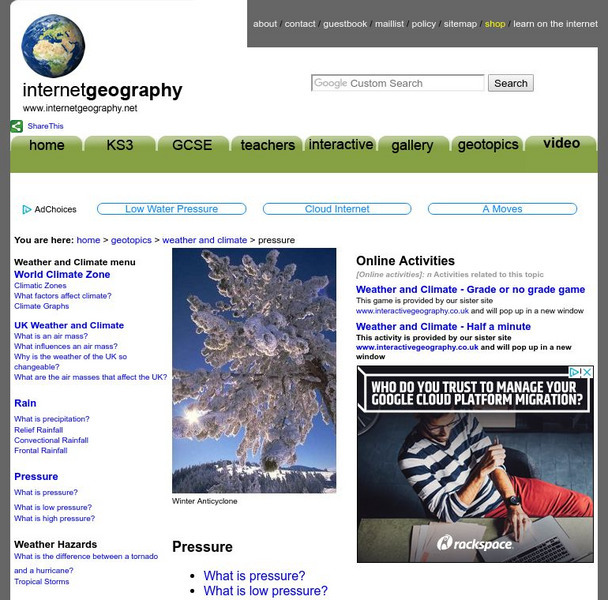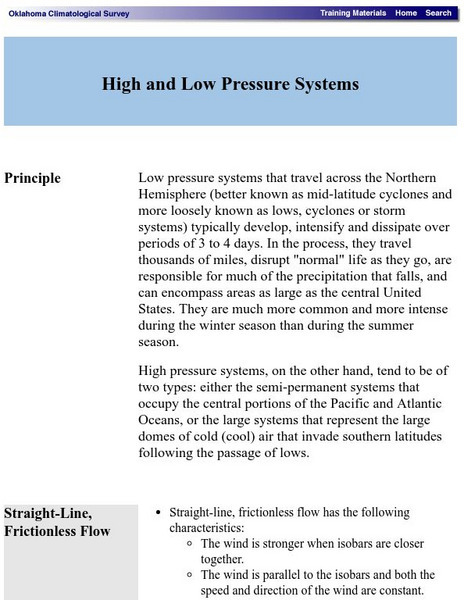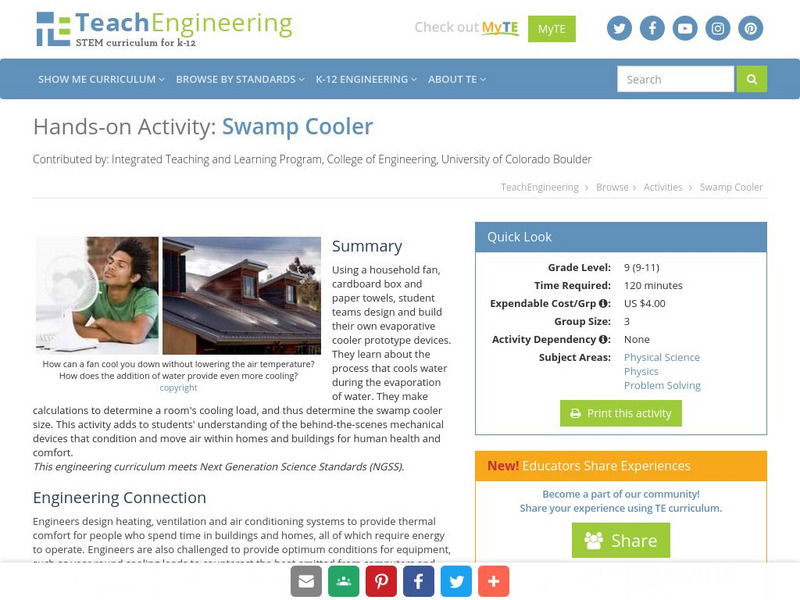Hi, what do you want to do?
Read Works
Read Works: Weather: Air Patterns
[Free Registration/Login Required] An informational text about wind patterns and how they relate to clouds, storms, and lightning. A question sheet is available to help students build skills in reading comprehension.
Other
Internet Geography: Geo Topics: Weather and Climate
This site explores air pressure and talks about high pressure. low pressure, and winter anticyclones.
NOAA
Noaa: Weather Systems and Patterns
Imagine our weather if Earth were completely motionless, had a flat dry landscape and an un-tilted axis. This, of course, is not the case; if it were, the weather would be much different. The local weather that impacts our daily lives...
Society for Science and the Public
Science News for Students: Bad for Breathing
A study provides new clues as to why some respiratory diseases are linked to air pollution.
Smithsonian Institution
National Air and Space Museum: Exploring the Planets: Earth's Lithosphere
The plate tectonics and other features of the Earth's lithosphere are explained and illustrated. Has links to definitions of the magnetosphere, atmosphere, and hydrosphere.
USA Today
Usa Today: How a Low Pressure System Affects Weather
Discusses the fronts and weather patterns associated with low pressure areas.
Idaho State University
Global Wind Systems [Pdf]
A great description of the global scale circulation and heat energy. Discusses a single-cell model, a three-cell model, jet streams and more.
Inner Body
Innerbody: Respiratory System: Terminal Bronchi and Alveoli
Detailed description and illustration of the terminal bronchi and alveoli.
Oklahoma Mesonet
University of Oklahoma: High and Low Pressure
This University of Oklahoma meteorology tutorial explores both high and low pressure systems--how they form and the different forms they take.
Smithsonian Institution
Smithsonian Institution: Time and Navigation
Explore navigation methods by sea, air, and space, what latitude and longitude mean, how GPS works, about satellite navigation, and learn about professional navigators. Includes a timeline of developments in navigation from 1280 to the...
Oklahoma Mesonet
University of Oklahoma: Overview of Meteorology
The University of Oklahoma explores numerous types of weather and atmospheric changes, as well as the reasons behind them. Content details the four seasons, common meteorological variables, the vertical structure of the atmosphere, how...
TeachEngineering
Teach Engineering: Swamp Cooler
Using a household fan, cardboard box and paper towels, student teams design and build an evaporative cooler (swamp cooler). They learn about the process that cools water during the evaporation of water. They make calculations to...
TeachEngineering
Teach Engineering: Breathe In, Breathe Out
Students are introduced to the respiratory system, the lungs and air. They learn about how the lungs and diaphragm work, how air pollution affects lungs and respiratory functions, some widespread respiratory problems, and how engineers...
Other
The Boeing Company
The official website of Boeing features information about commercial airplanes, military aircraft and missile systems, space and communications, Phantom Works, air traffic management, Boeing Capital Corp, connexion by Boeing, and more.
Other
David Suzuki Foundation: Climate Solutions
People power is the key to accelerating renewable energy in our homes and throughout our country. By acting together, we can drive real change in Canada that results in cleaner air, healthier communities and sustainable energy systems.
Indiana University
Indiana Univ.: Global Energy Transfer, Atmosphere and Ocean Circulation, Climate
A course lecture on the external processes that shape the Earth, specifically the hydrologic system. This system is powered by the Sun's energy. The components of the Earth's energy budget are described, and how these drive the movement...
Other
Met Office: What Is Jet Stream?
The jet stream consists of ribbons of very strong winds which move weather systems around the globe. Jet streams are found 9-16 km above the surface of the Earth, just below the tropopause, and can reach speeds of 200 mph.
US Government Publishing Office
Ben's Guide to u.s. Government: Ben's Ab Cs
Each letter of this alphabet is linked to an important aspect of the U.S. Government, e.g. "A is for Armed Forces" has a link to the Air Force. Links are made to the Bill of Rights, symbols, branches of government and The Constitution....
Science Education Resource Center at Carleton College
Serc: Lab 5: It's All Connected: Global Circulation
An investigation that is part of a series of lab lessons that expose students to Earth Systems through research, data, and visualizations. During this lab, students will focus on the pathways of wind and water to and from their location...
PBS
Pbs Teachers: Electric Money Teaching Guides (History of Money Resources)
Five teaching guides containing interdisciplinary lessons that can be used to explore the characteristics of money; how credit, debit, and smart cards work; financial markets and transactions; and similar topics. Designed as complements...
CK-12 Foundation
Ck 12: Life Science: Respiration
[Free Registration/Login may be required to access all resource tools.] We breathe because we need oxygen. Breathing also releases carbon dioxide from our bodies into the air. The respiratory system is the body system that brings air...
OpenStax
Open Stax: Requirements for Human Life
Earth and its atmosphere have provided us with air to breathe, water to drink, and food to eat, but these are not the only requirements for survival. Although you may rarely think about it, you also cannot live outside of a certain range...
US Environmental Protection Agency
Epa: Envirofacts Data Warehouse
Retrieve information from multiple sources of Envirofacts' System Data for your area of interest. using zip code, city, or county information.
Other
Warm Air: Solar Heating
Solar heating systems and their operation are described, and their benefits, both economic and environmental are discussed in detail.























